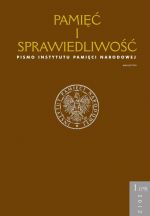Stosunki pomiędzy NSZZ „Solidarność” a PZPR w zakładach pracy województwa katowickiego jesienią 1981 roku
Relations between the “Solidarity” trade union and PZPR (Polish United Workers’ Party) in plants of Katowice voivodeship in autumn 1981
Author(s): JAKUB KazimierskiSubject(s): History, Recent History (1900 till today), Post-War period (1950 - 1989)
Published by: Instytut Pamięci Narodowej
Keywords: Trade unions; Solidarity (Solidarność); Polish United Workers’ Party; economic crisis; political conflict
Summary/Abstract: Since the very creation of “Solidarity”, the problem of mutual relations in enterprises between free trade unions and communist party structures, became highly important. From the first months of Solidarity’s activities, the situation at workplace was characterised by an aggravating conflict between the trade union supported by workers and the unaccepted communist party, generally for the economic and social crisis. The foundation of free trade unions and Solidarity’s dynamic activity in enterprises emphasised the scale of social disapproval of PZPR’s policies, demonstrating how feeble were the social foundations of communist rule, and the extent of the helplessness of PZPR’s basic structures in face of a social subject that was not subordinated to the ruling party. The conflict was especially deep in the enterprises of Katowice voivodeship, that were strategically important for the economy of PRL (People’s Republic of Poland). Relations between the communist party and the trade union suffered additionally in Silesian coal mines, as a consequence of the government’s resolution no. 199/81 – adopted against Solidarity’s will – imposing production in coal mines on free Saturdays. In autumn 1981, the process of leaving the Katowice communist party organization by its members continued, both by ordinary members of PZPR, and employed representatives of the party apparatus as well. Communist party’s units in plants, in many mines, mills and factories of the Katowice voivodeship practically lost their operating capacity, and their influence on workers was a complete fiction. The hierarchic structure of jurisdiction of the voivodeship executive over the ordinarymass of members, that had been developed for years, ceased to function in late autumn 1981. A few attempts, undertaken by the 1st secretary of the Voivodeship Committee (KW) of PZPR in Katowice, Andrzej Żabiński, to stimulate the activity of party members in Silesian plants, ended in complete failure. “Solidarity” added dynamics to social processes, by increasingly extending its influence over the operations of enterprises. In October 1981, the first demands were put forward to eliminate communist party structures from workplaces, and to deprive party secretaries of their job contracts. These tendencies intensified with particular force in the next weeks. In November and early December such demands were already voiced by many mines and mills of the Katowice voivodeship, sometimes in form of ultimatum. Similar processes took place in enterprises throughout the country. The demands to remove the communist party from enterprises were usually justified by the party’s political nature inconsistent with the economic purpose of enterprises, and the destructive impact of basic party cells and committees both on the personnel of enterprises, and their economic activities. The introduction of martial law and suspension of Solidarity’s activities stopped the developments that were dangerous for the communist party.
Journal: Pamięć i Sprawiedliwość.
- Issue Year: 19/2012
- Issue No: 1
- Page Range: 325-349
- Page Count: 25
- Language: Polish

